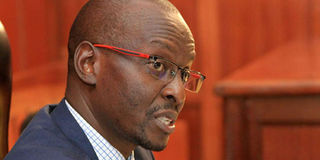DPP must give graft suspects evidence before trial – Court

Milimani Chief Magistrate Douglas Ogoti who has ruled that it is after the prosecution has disclosed the evidence and compiled an inventory of documents exchanged with the defence that trial in corruption cases will be commencing. PHOTO | FILE | NATION MEDIA GROUP
What you need to know:
- The details should include descriptions such as physical addresses, email and mobile phone number.
- The order was directed to the DPP, Police IG, EACC CEO and DCI.
The Director of Public Prosecution will not be allowed to start trial of corruption suspects before investigators furnish them with documentary and electronic evidence, the anti-corruption court in Nairobi has ruled.
Milimani Chief Magistrate Douglas Ogoti has ruled that it is after the prosecution has disclosed the evidence and compiled an inventory of documents exchanged with the defence that trial will be commencing.
Henceforth, it is only upon fulfilment of the conditions that he issued relating to disclosure of evidence, that the plea in corruption trials will be accepted for registration and only then will a matter be fixed for plea taking, insisted Mr Ogoti.
END DELAYS
In a decision that will bring to an end delays caused by State agencies in graft cases, the magistrate said the information that is subject to disclosure includes forensic and medical expert evidence.
Other information that the prosecution will be disclosing before trial is transcripts of interviews, video, audio recordings, photographs, telephone and listening device intercepts plus criminal records where relevant.
Also in the list are statements of witnesses, charge sheet and all other material in relation to a case whether relevant or not.
After furnishing the defence with the evidence, the magistrate said an inventory must be compiled containing details such as date, signatures, full names and description of the parties exchanging the documents.
PROPER DETAILS
The details, which Mr Ogoti said must be proper, should include descriptions such as physical addresses, email and mobile phone number. If the accused is represented by an advocate, the inventory should show the description of the advocate in the same manner.
"The relevant agencies to ensure that at the time of filing of the charge(s) in the anti-corruption court, they simultaneously file a copy of a duly executed inventory. It is upon the satisfaction of the (stated) requirements that the plea will be accepted for registration and only then will a matter be fixed for plea taking," said Mr Ogoti.
The order was directed to the Director of Public Prosecutions, Inspector-General of Police, CEO of the Ethics and Anti-Corruption Commission and the Director of Criminal Investigations to ensure compliance.
The chief magistrate said under the law, prosecutors are required to serve the defence with all material in their possession that is relevant in determining the guilt or innocence of the accused.
SONKO CASE
He made the ruling in a multi-million shilling corruption case involving Nairobi Governor Mike Sonko and 11 others and five trading companies. In that case, pre-trial conference was delayed by prosecution's failure to make full disclosure of evidence.
The magistrate noted that commencement of multiple other corruption cases has delayed due to nondisclosure that is within either control of the prosecution or the respective investigation agencies, which he termed as a dangerous trend.
“It is apparent that parties are held at ransom after plea has been taken. The parties and the court are taken in circles," said the magistrate.
The court introduced its own motion in the Governor Sonko's case on “why can’t the DPP/investigating agencies disclose (evidence) at the time of arrest just before plea? In any case investigations are complete by then”.
Though there are no legal provisions dealing with specific timelines on disclosure, Mr Ogoti said the Constitution requires disclosure of a charge to the accused with sufficient information to answer to the accusations.
NON-DISCLOSURE
"Sometimes justice demands non-disclosure of specific evidence at pre-trial stage with good reasons and with authority of the court. Such evidence will be held temporarily until the hearing when it will be fully disclosed to the accused," said Mr Ogoti.
According to him, the prosecution should not view disclosure as “common courtesy” but rather a legal requirement and prosecutors should encourage themselves and shift in the culture of viewing disclosure as a core justice duty.
"Justice is not for the prosecutor or defence counsel or the judicial officer but for the victim, the accused and the public at large and that is why the courts should ensure a fair trial," stated the magistrate.
He recognised that in the Kenya criminal justice system, the practice that has been ensuing is that the accused persons are basically “blindfolded” at the time of plea taking.
"The accused is kept in the dark on the facts and evidence against him and forced at many a time to enter a plea of guilty without knowing the strength of the case against him," noted Mr Ogoti.


